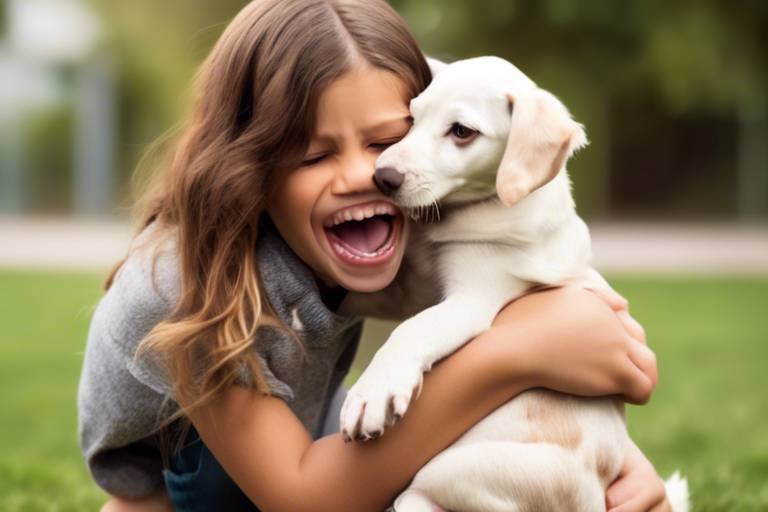The Importance of Keeping Adopted Pets in Their Forever Homes
This article explores the significance of ensuring adopted pets remain in loving homes, emphasizing the emotional, social, and practical benefits for both animals and their families. When we adopt a pet, we are not just taking on a responsibility; we are forming a bond that can last a lifetime. The joy of having a furry friend to share our lives with is immeasurable, but it comes with the promise of love and stability. Just as we seek comfort and consistency in our lives, so do our pets. They thrive in environments where they feel secure and cherished, making it essential to focus on keeping them in their forever homes.
Understanding the deep emotional connections that form between adopted pets and their new owners can shed light on the importance of stability in their lives. Imagine coming home after a long day and being greeted by a wagging tail or a gentle purr; that connection is what makes pet ownership so special. Pets are not just animals; they are family members who offer unconditional love and companionship. This bond is built on trust, and when a pet is uprooted from their home, it can lead to feelings of confusion and abandonment. The emotional toll on both the pet and the owner can be significant, making it crucial to prioritize their well-being by ensuring they remain in a loving environment.
Rehoming can lead to significant emotional distress for pets, affecting their behavior and overall well-being. It's crucial to recognize the potential consequences of moving them again. Just like humans, pets experience stress and anxiety when faced with change. They may not understand why they are being moved or why their familiar surroundings are gone. This disruption can lead to a host of behavioral issues, such as aggression, withdrawal, or excessive barking. Understanding the emotional impact of rehoming helps us appreciate the importance of commitment and stability in a pet's life.
Rehoming a pet often comes with challenges, including anxiety, confusion, and difficulty adjusting to new environments. These factors can severely impact their mental health. For instance, a once playful dog may become withdrawn or a cat may stop eating altogether. The process of adjusting to a new home can be overwhelming, and without proper support, many pets struggle to adapt. It's essential for potential pet owners to consider these challenges seriously before making the decision to adopt or rehome.
Identifying signs of stress in adopted pets is essential for their well-being. Common indicators include changes in behavior, appetite, and energy levels, requiring immediate attention. If you notice your pet hiding more than usual, refusing to eat, or displaying aggressive behavior, these could be red flags signaling that they are stressed. Being vigilant and responsive to these signs can make a significant difference in their adjustment and overall happiness.
The long-term effects of rehoming can manifest in various ways, including behavioral issues and difficulty forming new attachments. Understanding these impacts is vital for pet owners. A pet that has been rehomed multiple times may develop trust issues, becoming anxious or fearful in new situations. This cycle can lead to a lifetime of challenges for both the pet and their owner, reinforcing the need to create stable, loving environments from the outset.
Establishing strong support systems can help adopted pets transition smoothly into their forever homes, ensuring they receive the love and care they need. Pet owners should not hesitate to seek out resources, whether it's local pet training classes, community support groups, or online forums. These platforms provide valuable advice and encouragement, making the journey of pet ownership less daunting and more fulfilling.
A stable environment is crucial for the happiness and health of adopted pets. Simple changes in routine can significantly enhance their sense of security. Just like humans, pets thrive on predictability. Establishing a routine can help them understand what to expect throughout the day, reducing anxiety and fostering a sense of belonging.
Maintaining a consistent daily routine can help adopted pets feel secure and reduce anxiety. This includes regular feeding, exercise, and playtime. For example, feeding your pet at the same time every day not only establishes good habits but also reinforces their understanding of safety and security. Imagine how comforting it must be for them to know that their meals, walks, and playtime are predictable.
Providing safe spaces within the home allows adopted pets to retreat when feeling overwhelmed. These spaces can foster a sense of security and comfort. Consider creating a cozy corner with their bed, toys, and blankets where they can relax and feel safe. This sanctuary can be a game-changer, especially during stressful situations like loud noises or visitors.
Engaging with the community can provide additional support for adopted pets and their owners. Local resources can offer guidance and assistance to ensure lasting relationships. By connecting with fellow pet owners and participating in community events, you can create a network of support that benefits everyone involved.
Local adoption resources can help new pet owners navigate challenges and provide information on training, health care, and community events, enhancing the pet ownership experience. Many shelters and rescue organizations offer workshops and support groups, making it easier for you to learn how to best care for your new furry friend.
Connecting with other pet owners can create a supportive network, allowing for shared experiences and advice that benefit both pets and their families. This network can be invaluable, providing insights into training techniques, local pet-friendly events, and even pet care tips. After all, a happy pet often means a happy owner!
- Why is it important to keep adopted pets in their forever homes? Keeping adopted pets in their forever homes ensures they experience stability, reducing stress and anxiety associated with rehoming.
- What are the signs that my pet is stressed? Common signs of stress in pets include changes in behavior, appetite, and energy levels, such as hiding, aggression, or refusal to eat.
- How can I create a stable environment for my adopted pet? Establishing a consistent routine, providing safe spaces, and engaging with community resources can help create a stable environment for your pet.
- What resources are available for new pet owners? Local shelters and rescue organizations often provide resources like workshops, training classes, and support groups for new pet owners.

The Emotional Bond Between Pets and Owners
This article explores the significance of ensuring adopted pets remain in loving homes, emphasizing the emotional, social, and practical benefits for both animals and their families.
The relationship between pets and their owners is often described as one of the most rewarding connections we can experience in life. When you adopt a pet, you're not just bringing a furry friend into your home; you’re inviting a new member into your family. This bond goes beyond mere companionship; it’s a profound emotional connection that can provide comfort, joy, and a sense of purpose. Imagine coming home after a long day, and there’s your loyal dog wagging its tail, or your cat purring softly as it curls up next to you. These moments are priceless and serve as a reminder of how much our pets enrich our lives.
Research has shown that pets can significantly impact our mental health. They provide unconditional love and companionship, which can alleviate feelings of loneliness and anxiety. For many people, especially those who live alone, pets offer a sense of security and emotional support. In fact, studies indicate that pet owners often experience lower levels of stress and improved mood. This is because interacting with animals can release endorphins, the feel-good hormones, making us feel happier and more relaxed.
Moreover, pets have an incredible ability to read our emotions. They can sense when we’re feeling down and often respond in ways that bring us comfort. For instance, have you ever noticed how your dog seems to know when you’re upset and comes over to nuzzle you? Or how your cat will curl up in your lap when you’re feeling blue? These behaviors are evidence of the deep emotional ties that exist between pets and their owners. They are not just animals; they are our confidants, our companions, and sometimes even our therapists.
However, it’s essential to understand that this bond requires nurturing and stability. When pets are adopted, they may have already experienced trauma or instability in their previous homes. This makes it even more crucial for new owners to provide a consistent and loving environment. The emotional bond can only flourish in a space where pets feel safe and secure. The more stable and loving the environment, the stronger the connection will become.
In conclusion, the emotional bond between pets and their owners is a beautiful aspect of pet ownership that brings immense joy and fulfillment. By ensuring that adopted pets remain in their forever homes, we not only provide them with the love and security they need but also enrich our own lives in the process. Remember, adopting a pet is a lifelong commitment, and nurturing this bond is essential for the happiness of both parties.
- What are the signs that my pet is happy? Look for behaviors such as wagging tails, relaxed body language, and playful interactions.
- How can I strengthen my bond with my adopted pet? Spend quality time together through play, training, and cuddling to enhance your connection.
- What should I do if my pet shows signs of stress? Create a calm environment, establish a routine, and consult a veterinarian if necessary.

The Impact of Rehoming on Pets
Rehoming a pet is never an easy decision, and the emotional fallout can be profound, not just for the pet but for the entire family involved. Imagine being uprooted from your home, leaving behind familiar smells, sounds, and the people you love. For pets, this experience can be incredibly disorienting and distressing. When a beloved animal is placed in a new environment, the sudden change can lead to feelings of anxiety and confusion. It's crucial to understand that our furry friends thrive on stability and routine, and any disruption can have significant consequences.
One of the most immediate impacts of rehoming is the potential for behavioral changes. Pets may exhibit signs of distress, such as excessive barking, hiding, or even aggression. These behaviors are often a cry for help, indicating that they are struggling to cope with their new reality. Furthermore, the emotional toll of being rehomed can lead to long-term issues, including difficulty in forming new attachments and trust issues with humans. Just like humans, pets need time to adjust, and the process can be fraught with challenges.
Moreover, the stress of rehoming can affect a pet's physical health as well. Animals that are anxious or depressed may experience a decline in their appetite, leading to weight loss and other health problems. It's a vicious cycle where emotional distress translates into physical issues, making it even more critical to consider the long-term impacts of moving a pet from one home to another. The reality is that pets are not just animals; they are family members. They feel pain, joy, and confusion just like we do.
In addition, the effects of rehoming can be compounded by the age and temperament of the pet. Older animals, in particular, may struggle more with the transition, as they have spent years in one environment and may find it harder to adapt to a new one. On the other hand, younger pets might be more adaptable but can still experience significant stress. It's essential for potential pet owners to understand these nuances and consider them when deciding to adopt.
In summary, rehoming pets can lead to a cascade of emotional and behavioral issues that can affect their well-being for years to come. Recognizing the potential consequences of moving them again is vital for anyone considering adopting a pet. By ensuring that pets remain in their forever homes, we can help them avoid the trauma of rehoming and foster a loving, stable environment where they can thrive.
- What should I do if I can no longer keep my adopted pet? It's essential to explore all options before rehoming, such as reaching out to friends or family, or contacting local shelters for advice.
- How can I help my pet adjust to a new home? Providing a consistent routine, safe spaces, and plenty of love can help ease the transition for your pet.
- What are the signs that my pet is stressed after rehoming? Look for changes in behavior, such as increased hiding, loss of appetite, or aggression, which may indicate stress.
Rehoming a pet is not just a simple act of finding a new home; it’s a profound transition that can challenge both the animal and the new owner. Imagine being uprooted from your familiar surroundings, the scent of your home, and the people you love. For pets, this can be an overwhelming experience filled with anxiety and confusion. One of the primary challenges is the emotional turmoil that pets go through during this transition. They may feel abandoned, leading to feelings of insecurity and fear.
Furthermore, adjusting to a new environment can be quite daunting. Pets thrive on routine and familiarity, and when that is disrupted, they may respond negatively. Common issues that arise during this adjustment period include:
- Anxiety: Pets may exhibit signs of distress, such as excessive barking, whining, or destructive behavior.
- Confusion: New smells, sounds, and people can leave pets feeling disoriented and scared.
- Difficulty in bonding: It might take time for pets to build trust with their new owners, which can lead to behavioral issues if not handled with patience.
These challenges are not just temporary; they can have lasting effects on a pet's mental health. A pet that has been rehomed may develop a fear of abandonment, making it difficult for them to bond with their new family. This can create a cycle of anxiety and mistrust that is hard to break. The emotional scars left by rehoming can manifest in various ways, from aggression to withdrawal, making it essential for new owners to approach the situation with understanding and compassion.
Moreover, the adjustment period can also be taxing on the new owners. They might find themselves grappling with the pet's behavioral issues, leading to frustration and potentially causing them to reconsider their decision. This situation underscores the importance of providing a supportive and stable environment for adopted pets, ensuring that both the pet and the owner can thrive in their new relationship.
In conclusion, rehoming presents significant challenges that can affect the emotional and psychological well-being of pets. Understanding these challenges can help new owners provide the necessary support and care to ensure their adopted pets feel safe and loved in their forever homes.
- What should I do if my newly adopted pet shows signs of stress?
- How long does it usually take for a pet to adjust to a new home?
- Can I help my pet feel more secure in their new home?
It’s essential to give your pet time to adjust. Create a comfortable space for them, maintain a routine, and be patient. If stress persists, consult with a veterinarian or a pet behaviorist.
Adjustment can vary greatly depending on the pet's personality and past experiences. It may take anywhere from a few days to several weeks for them to feel comfortable.
Yes! Establishing a consistent routine, providing safe spaces, and engaging in regular playtime can help your pet feel more secure.
This article explores the significance of ensuring adopted pets remain in loving homes, emphasizing the emotional, social, and practical benefits for both animals and their families.
Understanding the deep emotional connections that form between adopted pets and their new owners can shed light on the importance of stability in their lives.
Rehoming can lead to significant emotional distress for pets, affecting their behavior and overall well-being. It's crucial to recognize the potential consequences of moving them again.
Rehoming a pet often comes with challenges, including anxiety, confusion, and difficulty adjusting to new environments. These factors can severely impact their mental health.
Identifying signs of stress in adopted pets is essential for their well-being. Just like humans, pets can experience stress, and it often manifests in various ways. For instance, you might notice your furry friend acting differently than usual. Some common indicators include:
- Changes in Behavior: If your pet suddenly becomes aggressive or overly withdrawn, it might be a sign of stress.
- Altered Appetite: A pet that is stressed may either eat less or overeat, which can lead to health issues.
- Increased Vocalization: If your pet is barking, meowing, or whining more than usual, they could be trying to communicate their discomfort.
- Excessive Grooming: Some pets may groom themselves excessively as a coping mechanism, which can lead to skin issues.
- Destructive Behavior: Chewing on furniture or digging can be signs of anxiety in pets.
Recognizing these signs early can help you take the necessary steps to alleviate your pet's stress. Providing a calm and consistent environment is key. If you notice any of these behaviors persisting, consulting with a veterinarian or a pet behaviorist can provide additional strategies to support your furry friend.
The long-term effects of rehoming can manifest in various ways, including behavioral issues and difficulty forming new attachments. Understanding these impacts is vital for pet owners.
Establishing strong support systems can help adopted pets transition smoothly into their forever homes, ensuring they receive the love and care they need.
A stable environment is crucial for the happiness and health of adopted pets. Simple changes in routine can significantly enhance their sense of security.
Maintaining a consistent daily routine can help adopted pets feel secure and reduce anxiety. This includes regular feeding, exercise, and playtime.
Providing safe spaces within the home allows adopted pets to retreat when feeling overwhelmed. These spaces can foster a sense of security and comfort.
Engaging with the community can provide additional support for adopted pets and their owners. Local resources can offer guidance and assistance to ensure lasting relationships.
Local adoption resources can help new pet owners navigate challenges and provide information on training, health care, and community events, enhancing the pet ownership experience.
Connecting with other pet owners can create a supportive network, allowing for shared experiences and advice that benefit both pets and their families.
Q: How can I tell if my adopted pet is stressed?
A: Look for signs such as changes in behavior, appetite, vocalization, and grooming habits. If you notice these signs, it may be time to evaluate your pet's environment and routine.
Q: What should I do if I notice signs of stress in my pet?
A: Provide a calm environment, maintain a consistent routine, and consider consulting a veterinarian for professional advice.
Q: Can rehoming affect my pet's behavior long-term?
A: Yes, rehoming can lead to behavioral issues and difficulty forming attachments. It's essential to provide stability and support to help your pet adjust.
Rehoming a pet can have profound and lasting effects that ripple through their lives, often manifesting in ways that are not immediately apparent. When a beloved animal is uprooted from their familiar surroundings and placed in a new home, they can experience a whirlwind of emotions. Imagine being suddenly taken from your cozy home and thrust into an unfamiliar environment; the feelings of confusion and anxiety can be overwhelming. For pets, this experience can lead to significant behavioral issues and emotional scars that may take a long time to heal.
One of the most common long-term effects of rehoming is the development of anxiety disorders. Pets may become excessively fearful or anxious, leading to behaviors such as barking, hiding, or even aggression. This anxiety can stem from their previous experiences, especially if they were abandoned or mistreated. The longer a pet remains in a state of distress, the more ingrained these behaviors become, making it increasingly challenging for them to adapt to new situations.
Additionally, rehomed pets may struggle to form new attachments. Just as humans may find it hard to trust again after a traumatic experience, pets can also be hesitant to bond with new owners. They might display signs of detachment, such as avoiding interaction or showing reluctance to engage in play. This can create a heartbreaking cycle where the pet feels lonely and the owner feels rejected, further complicating their relationship.
Moreover, the impact on physical health should not be overlooked. Stress and anxiety can lead to various health problems in pets, including digestive issues and weakened immune systems. For example, a pet suffering from stress may experience a loss of appetite, leading to weight loss and nutritional deficiencies. In contrast, some pets may turn to overeating as a coping mechanism, resulting in obesity and related health issues. It’s crucial for pet owners to recognize these potential health risks and take proactive steps to mitigate them.
Understanding these long-term effects emphasizes the importance of providing a stable, loving environment for adopted pets. By recognizing the signs of distress and taking the necessary steps to create a nurturing atmosphere, owners can help their furry companions heal and thrive. Remember, the journey of an adopted pet is not just about finding a home; it’s about building a lasting bond that can withstand the test of time.
- What are the signs that my pet is stressed after rehoming?
Common signs include changes in behavior, such as increased hiding, aggression, or excessive barking. Changes in appetite and energy levels can also indicate stress.
- How can I help my pet adjust to their new home?
Establish a consistent routine, provide safe spaces, and give them time to explore their new environment at their own pace.
- Is it normal for rehomed pets to take time to bond with their new owners?
Yes, it is completely normal. Pets may need time to trust their new owners, especially if they have experienced trauma in the past.
When you welcome an adopted pet into your home, you're not just bringing in a furry friend; you're also taking on the responsibility of ensuring their happiness and well-being. One of the most effective ways to do this is by establishing strong support systems that cater to both the pet and the owner. These systems can include various resources, community connections, and personal strategies that help create a nurturing environment for your new companion.
First and foremost, it's essential to recognize that the transition to a new home can be overwhelming for pets. They may feel anxious, confused, or even scared in their new surroundings. To ease this transition, consider reaching out to local animal shelters or rescue organizations. Many of these organizations offer post-adoption support, which can include advice on training and behavior management, as well as resources for veterinary care. This support can be invaluable, especially for first-time pet owners who may not know what to expect.
Moreover, connecting with other pet owners in your community can be a game-changer. Think of it as building a little village for your pet. Joining local pet groups or online forums can provide a wealth of knowledge and shared experiences. You can exchange tips on everything from nutrition to training techniques, and even arrange playdates for your pets. These interactions not only benefit your pet's socialization but also help you build friendships with fellow pet lovers who understand the unique joys and challenges of pet ownership.
Another critical aspect of support systems is the role of professional trainers and behaviorists. Sometimes, pets may exhibit behaviors that are challenging to manage, especially after a change in environment. In such cases, consulting with a professional can provide tailored strategies to address specific issues. Whether it's helping your pet overcome separation anxiety or teaching them basic commands, expert guidance can make a significant difference in their adjustment process.
Additionally, consider implementing a regular schedule for your pet. Having a consistent routine can provide a sense of security for your furry friend. This includes regular feeding times, daily walks, and play sessions. When pets know what to expect, they tend to feel more at ease. You might also want to create a safe space in your home where your pet can retreat when they need a break from the hustle and bustle. This could be a cozy corner with their bed and toys, allowing them to relax and recharge.
Ultimately, the goal of these support systems is to foster a loving and stable environment where your adopted pet can thrive. By being proactive and seeking out resources, you can ensure that your new companion feels secure, loved, and part of the family. Remember, a happy pet makes for a happy home!
- What should I do if my adopted pet shows signs of stress? It's essential to identify the signs of stress, such as excessive barking, hiding, or changes in eating habits. Providing a safe space and maintaining a consistent routine can help alleviate their anxiety.
- How can I find local resources for pet owners? Check with local animal shelters, pet stores, or community centers for information on training classes, support groups, and events for pet owners.
- Is professional training necessary for adopted pets? While not always necessary, professional training can be beneficial, especially if your pet exhibits behavioral issues. It can provide you with the tools to address these challenges effectively.

Creating a stable environment for adopted pets is not just a nice-to-have; it's a necessity for their well-being. When pets are brought into a new home, they often experience a whirlwind of changes. Imagine being uprooted from everything familiar and tossed into a new space where nothing feels quite right. This is the reality for many adopted animals, and as their new human companions, it’s our job to make that transition as smooth as possible. A stable environment can significantly reduce their stress levels and help them adjust more quickly to their new life.
One of the most effective ways to create this stability is through routine and consistency. Pets thrive on predictability, and establishing a daily schedule can offer them a sense of security. Regular feeding times, daily walks, and play sessions should be as consistent as possible. This not only helps them know what to expect but also strengthens the bond between pet and owner. For example, if you feed your dog at 7 AM every morning, they will learn to associate that time with food and comfort, easing their anxiety.
Moreover, it's essential to provide safe spaces within your home. Just like we sometimes need our own little corners to retreat to when life gets overwhelming, pets also benefit from having areas where they can feel safe and secure. These spaces should be quiet and cozy, filled with their favorite toys or blankets. A simple dog bed in a corner or a cat tree by the window can serve as their sanctuary. By allowing them to retreat to these safe spots, you’re giving them the freedom to manage their own comfort levels.
Another crucial aspect of creating a stable environment is ensuring that your home is physically safe. This means securing any hazardous items, such as cleaning supplies or electrical cords, that could pose a threat to curious paws. You might think of your home as a cozy haven, but for pets, it can be a maze of potential dangers. Taking the time to pet-proof your space will not only protect your furry friends but also give you peace of mind.
Additionally, consider the social environment. Pets are social creatures, and their interactions with family members can greatly affect their happiness. Encourage positive interactions among all household members, ensuring that everyone knows how to approach and handle the pet. For instance, teaching children to be gentle and respectful can create a harmonious atmosphere that fosters trust and love.
Lastly, remember that patience is key. Transitioning into a new home can take time, and each pet will adjust at their own pace. Be prepared for some hiccups along the way, and don’t hesitate to seek help if needed. Whether it’s consulting a vet or reaching out to a local animal behaviorist, utilizing available resources can make a world of difference. The goal is to create an environment where your adopted pet feels safe, loved, and truly at home.
- How long does it take for an adopted pet to adjust? It varies by pet, but typically, it can take anywhere from a few days to several weeks for them to feel comfortable.
- What are some signs that my pet is feeling stressed? Common signs include excessive barking, hiding, changes in appetite, and destructive behavior.
- Can I change my pet's routine after they adjust? Yes, but make changes gradually to avoid causing additional stress.
- What should I do if my pet seems anxious? Provide a safe space, maintain a routine, and consult a veterinarian if anxiety persists.
This article explores the significance of ensuring adopted pets remain in loving homes, emphasizing the emotional, social, and practical benefits for both animals and their families.
Understanding the deep emotional connections that form between adopted pets and their new owners can shed light on the importance of stability in their lives.
Rehoming can lead to significant emotional distress for pets, affecting their behavior and overall well-being. It's crucial to recognize the potential consequences of moving them again.
Rehoming a pet often comes with challenges, including anxiety, confusion, and difficulty adjusting to new environments. These factors can severely impact their mental health.
Identifying signs of stress in adopted pets is essential for their well-being. Common indicators include changes in behavior, appetite, and energy levels, requiring immediate attention.
The long-term effects of rehoming can manifest in various ways, including behavioral issues and difficulty forming new attachments. Understanding these impacts is vital for pet owners.
Establishing strong support systems can help adopted pets transition smoothly into their forever homes, ensuring they receive the love and care they need.
A stable environment is crucial for the happiness and health of adopted pets. Simple changes in routine can significantly enhance their sense of security.
Maintaining a consistent daily routine can help adopted pets feel secure and reduce anxiety. Just like humans thrive on routine, pets find comfort in knowing what to expect each day. Imagine waking up to a chaotic morning where nothing is predictable; it can be stressful, right? The same applies to our furry friends.
To create a stable environment, consider the following elements of routine:
- Regular Feeding Times: Consistent meal times help regulate your pet's digestion and create a sense of normalcy.
- Daily Exercise: Scheduled walks or play sessions not only keep your pet physically healthy but also mentally stimulated.
- Playtime: Engaging in regular play helps strengthen the bond between pet and owner, making your pet feel loved and secure.
Additionally, it's essential to be mindful of any changes in your pet's routine, such as moving to a new home or introducing new family members. These transitions can be overwhelming, so keeping as much of their routine intact as possible can ease the adjustment period. For instance, if you usually feed your pet at 7 AM, try to maintain that schedule even during changes.
In essence, a predictable routine offers pets a sense of stability and helps them navigate their world with confidence. It's like giving them a roadmap of their day, ensuring they know what lies ahead. This not only reduces anxiety but also fosters a deeper bond between pets and their owners.
Engaging with the community can provide additional support for adopted pets and their owners. Local resources can offer guidance and assistance to ensure lasting relationships.
Local adoption resources can help new pet owners navigate challenges and provide information on training, health care, and community events, enhancing the pet ownership experience.
Connecting with other pet owners can create a supportive network, allowing for shared experiences and advice that benefit both pets and their families.
- Why is it important to keep adopted pets in their forever homes?
- Keeping adopted pets in their forever homes ensures they experience stability, reducing stress and anxiety, and enhancing their emotional well-being.
- What are the signs that my pet is stressed?
- Common signs include changes in behavior, loss of appetite, excessive barking or meowing, and withdrawal from social interactions.
- How can I help my newly adopted pet adjust?
- Establish a consistent routine, provide safe spaces, and be patient as your pet acclimates to their new environment.
Creating safe spaces for your adopted pets is not just a nice idea; it's a necessity. Imagine how you feel after a long, stressful day. You probably want to retreat to a cozy corner of your home, a place where you can unwind and feel secure. Pets experience similar emotions and need their own little sanctuaries to escape the hustle and bustle of daily life. A safe space allows them to recharge, reducing anxiety and promoting a sense of well-being.
So, what does a safe space look like for your furry friend? It could be a designated corner of a room with their favorite blanket, a comfy bed, or even a quiet crate where they can feel protected. The key is to ensure that this area is free from disturbances and filled with their favorite toys or comforting items. Think of it as their personal retreat, where they can curl up and feel at ease.
Here are some tips to create the perfect safe space for your pet:
- Choose the Right Location: Look for a quiet area of your home away from noise, foot traffic, and other pets. This could be a cozy nook in the living room or a corner in the bedroom.
- Comfortable Bedding: Provide soft bedding or a pet bed that your animal loves. This will encourage them to use the space whenever they need a break.
- Personal Items: Include items that smell like you or their favorite toys. Familiar scents can be incredibly comforting for pets.
- Limit Access: If your pet needs a break, make sure they can have some uninterrupted time. This might mean training other family members to respect their space.
By setting up these safe areas, you're not only giving your pet a place to retreat to but also reinforcing a sense of stability in their new environment. This is especially crucial for adopted pets who may have experienced instability in their previous homes. Think of it as providing them with a lifeboat in a sometimes overwhelming sea of new experiences and changes.
Remember, the goal is to make your pet feel secure, loved, and understood. The more they feel at home, the stronger the bond between you will become. After all, a happy pet means a happy household!
Q1: How can I tell if my pet is comfortable in their safe space?
A1: Look for signs such as your pet voluntarily spending time in their designated area, playing with toys there, or curling up in their bedding. If they seem relaxed, it's a good indication that they're comfortable.
Q2: Can I create multiple safe spaces for my pet?
A2: Absolutely! Many pets enjoy having multiple retreats throughout the house, especially if they feel overwhelmed in one area. Just ensure each space is cozy and inviting.
Q3: What if my pet refuses to use their safe space?
A3: If your pet isn't using their safe space, try to make it more appealing. Add their favorite toys, spend time with them in that area, or even use treats to encourage them to explore it.

Engaging with the community is not just a nice-to-have; it's an essential aspect of ensuring that adopted pets thrive in their new homes. When you bring a pet into your life, you're not just welcoming a furry friend; you're also stepping into a broader community of animal lovers and advocates. This network can provide invaluable support, resources, and camaraderie that can make all the difference in your pet's adjustment and well-being.
One of the most significant advantages of community involvement is the access to local resources. Many communities have organizations dedicated to pet adoption, training, and health care. These organizations often host events where pet owners can learn about best practices for pet care, attend workshops, and even participate in fun activities that strengthen the bond between pets and their owners. For example, local shelters might offer free training sessions or health check-ups, which can alleviate some of the stress that comes with new pet ownership.
Additionally, being part of a community allows for the sharing of experiences and advice. Have you ever faced a challenge with your pet that left you scratching your head? Connecting with other pet owners can provide you with insights and solutions that you might not have considered. Whether it's dealing with a behavioral issue or finding the best food for your pet, having a support network means you're never alone in your journey. You can share stories, tips, and even laugh about the silly things our pets do that only fellow pet owners can truly appreciate.
Moreover, community involvement can foster a sense of belonging. Participating in local events, such as pet parades or adoption fairs, not only helps to socialize your pet but also creates a bond between you and other pet owners. These events can be a fantastic way to meet new friends—both human and furry! You might find a walking buddy or someone to share tips with, which can make the experience of pet ownership even more rewarding.
In summary, the importance of community support for adopted pets cannot be overstated. It enriches the lives of pets and their owners, providing essential resources, shared experiences, and a sense of belonging. So, whether it’s attending local events, joining online forums, or simply chatting with fellow pet owners at the dog park, engaging with your community can lead to happier, healthier lives for both you and your adopted furry friend.
- Why is community support important for adopted pets?
Community support provides resources, advice, and a sense of belonging that can significantly improve the adjustment and well-being of adopted pets. - How can I find local resources for pet care?
Check with local shelters, veterinary clinics, and community centers for information on workshops, training sessions, and health care events. - What types of events can I participate in with my pet?
Look for pet parades, adoption fairs, training workshops, and community meet-ups to socialize your pet and connect with other owners.
When you adopt a pet, the journey doesn’t end at the shelter; it’s just the beginning! Local adoption resources play a pivotal role in ensuring that both you and your new furry friend thrive together. These resources can range from community organizations to online forums, all aimed at providing support, guidance, and education for pet owners. Imagine having a treasure chest of information at your fingertips, ready to help you navigate the ups and downs of pet ownership!
Many communities have dedicated organizations that offer various services, including training classes, health care advice, and even social events for pets and their owners. For instance, local animal shelters often host workshops on responsible pet ownership, which can be incredibly beneficial for first-time adopters. These workshops might cover essential topics such as:
- Basic obedience training
- Understanding pet behavior
- Nutrition and health care
- Socialization techniques
Additionally, local veterinarians frequently collaborate with these organizations to provide discounted health check-ups and vaccinations for adopted pets. This partnership not only ensures that your pet remains healthy but also helps ease the financial burden of veterinary care. It’s like having a safety net that catches you when you need it the most!
Moreover, engaging with local pet communities through social media platforms can be incredibly rewarding. Online groups allow pet owners to share experiences, seek advice, and even arrange playdates for their pets. This sense of camaraderie can significantly enhance the pet ownership experience, making you feel less alone in your journey. After all, who better to understand the joys and challenges of pet ownership than fellow pet lovers?
To summarize, local adoption resources are invaluable assets for every pet owner. They provide essential support, foster community connections, and enhance the overall experience of pet ownership. By tapping into these resources, you’re not just ensuring a better life for your pet; you’re also enriching your own life with knowledge, friendships, and countless memorable moments!
Q1: What types of local adoption resources are available?
A1: Local adoption resources can include animal shelters, veterinary clinics, pet training centers, and community groups focused on animal welfare. Many of these organizations offer workshops, discounted health services, and social events for pet owners.
Q2: How can I find local adoption resources in my area?
A2: You can search online for animal shelters and pet organizations in your area. Social media platforms often have community groups where local resources are shared. Additionally, local veterinarians can provide recommendations.
Q3: Are there costs associated with using local adoption resources?
A3: While many resources are free or low-cost, some workshops or training sessions may require a fee. It’s best to inquire directly with the organization to understand any potential costs.
Q4: Can local adoption resources help with behavioral issues in pets?
A4: Absolutely! Many local organizations offer training programs and workshops specifically designed to address behavioral issues. Consulting with a professional trainer or behaviorist can significantly improve your pet’s behavior and your relationship with them.
Building a network of pet owners is not just a fun idea; it’s a game-changer for both you and your furry friend. Imagine having a group of people who understand the challenges and joys of pet ownership, who can share tips, tricks, and even a few laughs. This network can be a lifeline, especially during those moments when you feel overwhelmed or unsure about your pet’s behavior. Whether you're a first-time pet owner or a seasoned pro, connecting with others can provide invaluable support.
One of the best ways to start building this network is by joining local pet groups or online forums. These spaces are filled with like-minded individuals who are eager to share their experiences. You can exchange stories about your pets, discuss training techniques, or even plan playdates. The sense of community that develops can be incredibly comforting, reminding us that we’re not alone in our pet parenting journey.
Additionally, attending local events such as adoption fairs, pet expos, or dog parks can open doors to new friendships. These gatherings are perfect opportunities to meet fellow pet owners, share advice, and even discover local resources. You might find a dog trainer, a vet, or a pet sitter who comes highly recommended by someone you just met. The connections you make can enhance your pet’s life and yours!
Moreover, creating a social media group dedicated to pet owners in your area can be a fantastic way to stay connected. You can share photos, ask for advice, and even organize group activities like walks or training sessions. This not only strengthens your bond with your pet but also fosters a sense of belonging within the community.
In essence, building a network of pet owners is about creating a support system that enriches the lives of both pets and their humans. It’s about sharing the love, the challenges, and the triumphs of pet ownership. Remember, you’re not just raising a pet; you’re part of a larger family of animal lovers who are all in this together!
- How can I find local pet owner groups? Check social media platforms, community bulletin boards, or local animal shelters for events and groups.
- What are the benefits of connecting with other pet owners? You can share experiences, gain advice, and create a support system for both you and your pet.
- Are there online resources for pet owners? Yes! Websites and forums like Reddit, Facebook groups, and dedicated pet care sites offer a wealth of information.
Frequently Asked Questions
- Why is it important to keep adopted pets in their forever homes?
Keeping adopted pets in their forever homes is crucial because it fosters a strong emotional bond between the pet and the owner. This stability not only benefits the pet by providing a secure environment but also enhances the owner's experience, creating a fulfilling companionship.
- What are the signs that my adopted pet is stressed?
Common signs of stress in adopted pets include changes in behavior such as increased aggression or withdrawal, alterations in appetite, and fluctuations in energy levels. If you notice these changes, it’s essential to address them quickly to ensure your pet's well-being.
- How can I create a stable environment for my adopted pet?
Creating a stable environment involves establishing a consistent daily routine, providing safe spaces for your pet to retreat when feeling overwhelmed, and ensuring regular feeding and exercise schedules. These simple steps can significantly enhance your pet's sense of security.
- What challenges might I face if I need to rehome my pet?
Rehoming a pet often brings challenges such as anxiety, confusion, and difficulty adjusting to new surroundings. These factors can severely impact your pet's mental health, making it vital to consider the long-term effects before making such a decision.
- How can community resources help me as a pet owner?
Community resources can provide valuable support for new pet owners by offering guidance on training, healthcare, and local events. Engaging with these resources can enhance your pet ownership experience and help you navigate any challenges you may face.
- Is it normal for adopted pets to have trouble forming new attachments?
Yes, it is quite normal for adopted pets to struggle with forming new attachments, especially if they have experienced rehoming in the past. Understanding this can help you be patient and supportive as your pet adjusts to their new environment.
- What role does routine play in my pet's happiness?
Routine plays a significant role in your pet's happiness as it creates a sense of predictability and security. Regular feeding, exercise, and playtime can help reduce anxiety and promote a healthier, happier pet.



















